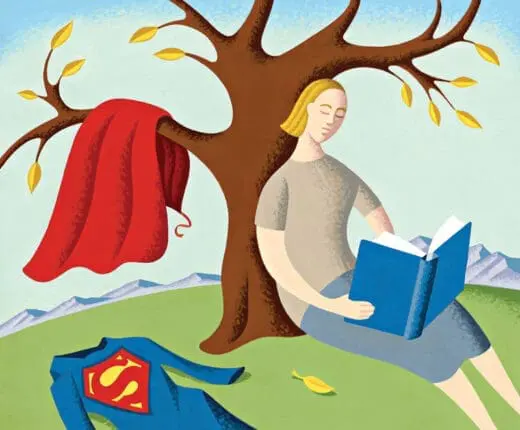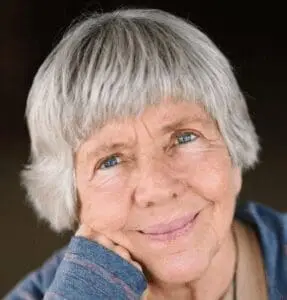Enjoy the audio preview version of this article—perfect for listening on the go.
On a Thursday in August, my husband, Jim, and I drove to Colorado to spend a few days in Boulder attending the Planet Bluegrass Folks Festival. We’d had a summer of responsibility—caring for our infant grandson, Otis, and helping my disabled sister through three hospital stays, a stint in rehab, and various arrangements for in-home nursing and physical therapy. Driving to Colorado, with Otis happily ensconced in his new daycare and my sister temporarily okay, I felt carefree for the first time in many months.
Jim and I had our usual fun. We dined at an Italian restaurant on Pearl Street. At our Chautauqua cabin, I slept on an outdoor porch that abuts the Flat Iron Mountains and fell asleep looking at stars. Friday, we attended the festival in all its hippie glory. But Saturday, I decided to stay home and have one day to myself.
After Jim dropped me off at Pearl Street in the morning and headed on to the festival, I walked to one of my favorite places, the Boulder Bookstore, where I lost myself in books. Later, I ambled next door to a place with outdoor dining and ordered sushi and a glass of wine. I watched people walk by—the tourists, the students, the street people, and the very rich. I savored each bite of fish and each sip of wine. Afterward, I began the slow climb back to our mountain cabin, turning into an old graveyard that Jim and I had driven by for years. We’d always been “too busy” to stop, but this afternoon I had time.
I wandered about, looking at the old settlers’ graves, some dating back to the 1840s. I looked for the tombstones of women and children and read the old inscriptions, many of which still carried the agony of the moment in which they were conceived. Rosa Peterman, who’d died at age 10 on May 6, 1881, had a small white stone with the words “Our Rosa.” Another stone was of two brothers—Larry, age 4, and Roy, age 6 months—who died within six days of each other in January 1880. Their crumbling gravestone had two small doves flying away together. In cemeteries, the same thought always arises in me—they come and they go; we come and we go—and it gives me a sense of peace. An old samurai saying also was on my mind that day—only a fool is in a hurry.
Arriving at our little cabin midafternoon, I read until bedtime. I stopped occasionally to snack on fresh figs and peaches, and moved from the front porch to the back porch as the sun traveled across the sky, but otherwise, I just read. I can’t remember a day when I was so happy.
The next day I realized that what I’d done was much larger then the sum of its parts. I’d experienced something I don’t recall ever experiencing, at least not since college or before I’d been pregnant with my son: I’d enjoyed a day when I did whatever I wanted all day long, moving slowly and quietly enough to be genuinely contemplative.
I experienced with a new clarity the stories I tell myself—stories that may or may not be true—and how I often act on impulse based on them. My most common story, for example, is that someone needs me and I must rescue him or her. This story has led me to make many impulsive offers to help, even though many times, I have neither the time nor the talents nor the inclination to help. Because of this primary story, I often become my own worst enemy, constantly signing myself up for combat duty when I really want to stay home, pet my cats, and read a book. Or I harm myself when I truly want to see a friend, but make no time for it because I’m too busy meeting the real or imagined needs of others.
This story comes from a long time ago, when I was a needy little girl who could feel safe only if I reassured myself I was helpful. I don’t judge that little girl. Her story was, I still believe, quite close to reality. Of course, as an identity, being a good helper isn’t the worst choice, and that story has led me to a life of satisfying work, but I’m at the point in my life when I could choose not to continue that little Mary story. I could practice what the Buddhists call nonattachment, recognizing that sometimes we’re so locked in stories with others that the relationships grow stale and we can’t find room for creativity or spontaneity.
Our stories are simply what we habitually tell ourselves. They may be useful, or they may be limiting. For example, I constantly tell myself some version of “I’m worried about . . . .” My life would be different if instead I told myself, “I’m curious about . . . .” I often think, “This person needs me.” My experience with the person in question would be different if I simply thought, “This person likes me.” In short, we tell ourselves stories, and our stories tell ourselves us.
At 67, I feel a little overwhelmed at the thought of making major life changes. Perhaps it’s best to accept who I am. Yet a part of me is crying uncle at the thought of a lifetime of continuous helpful behavior. What if I just stopped trying to be a hero every day of my life? What if I simply allowed myself to drop all story lines? Could I lead a nonpurpose-driven life?
Of course, that becomes a story too, but it’s a new story—and I smile when I think of it. One day in Colorado showed me how much fun that story new could be.
With intention, perhaps I can live within this new story. Not all the time, of course. My driven need to save the world all by myself will return. But maybe I can be free sometimes. The lucky thing about human life is that we have a little wiggle room.
Illustration © Adam Niklewicz
Mary Pipher
Mary Pipher, PhD, is a clinical psychologist, author, and climate activist. She’s a contributing writer for The New York Times and the author of 12 books, including Reviving Ophelia, Women Rowing North, and her latest, A Life in Light. Four of her books have been New York Times bestsellers. She’s received two American Psychological Association Presidential Citation awards, one of which she returned to protest psychologists’ involvement in enhanced interrogations at Guantanamo.













